Just days after the birth of their second child, parents Petru and Natalia Obada broke down in tears.
Rather than celebrating the newest addition and sharing their bundle of joy with friends and family, the couple traipsed around hospitals and GP consultation rooms.
Within weeks of welcoming baby Sophia into the world, the family were told she was born with a rare disease and without surgery she could permanently lose her eyesight.
Now, the couple are hoping to take their nine-month-old to Spain for specialist eyelid surgery that will help her ‘see the world she lights up’.
Working against the clock, Petru, 31, and Natalia, 32, are hoping the surgery will give Sophia her eyesight back, but without exposure to light, their daughter’s chances are quickly deteriorating.
Now Petru and Natalia have launched a GoFundMe to raise money for the vital surgery and hope the money raised will help them cover the medical costs in Spain, travel and accommodation and medical support for their little one.
Petru, an HS2 engineer, and Natalia, a stay-at-home mother, were shocked to discover their daughter had a rare disease – especially after their son David, three, was born without any complications.
The couple, based in Banbury, Oxfordshire, had a ‘classic’ pregnancy and everything seemed fine.
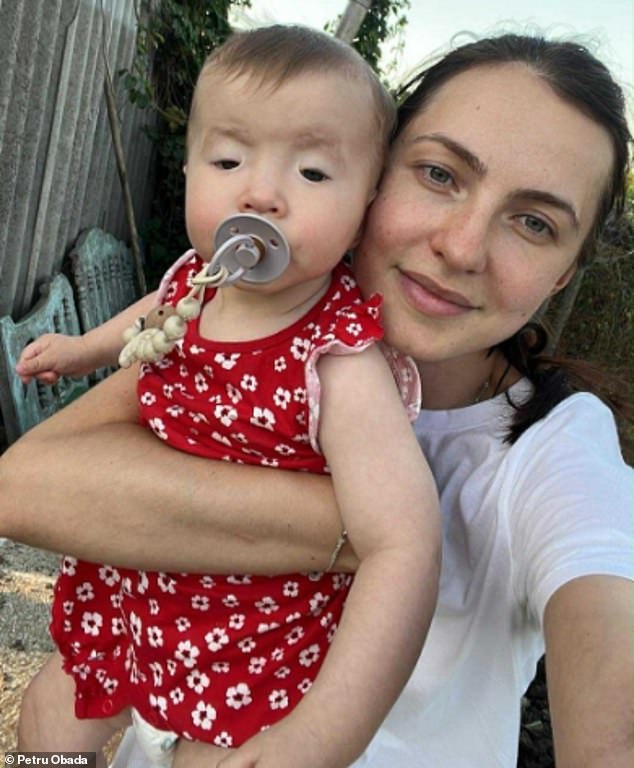
Petru and Natalia Obada were told their nine-month-old daughter Sophia was born with a rare disease and without surgery she could permanently lose her sight (Natalia and Sophia)
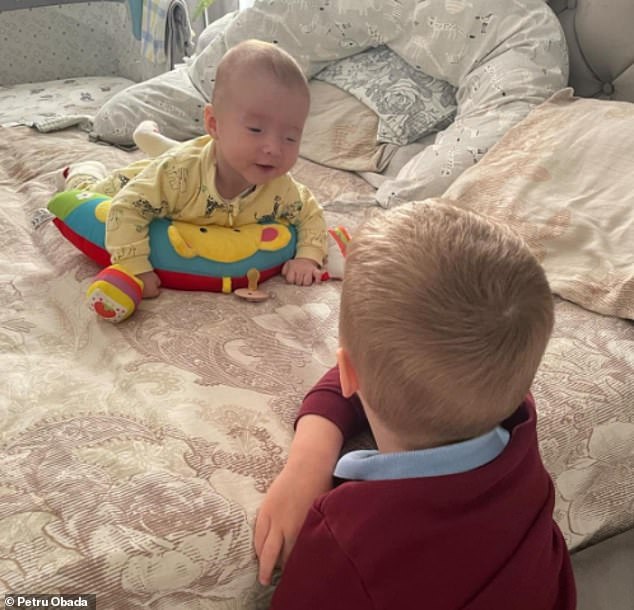
The couple were shocked by the news after their healthy first pregnancy and said not even the doctors had picked up on anything (Sophia pictured with her older brother David)
Petru told the Daily Mail: ‘My wife’s pregnancy was perfectly normal. All the tests came back clear and the delivery at 42 weeks was perfectly normal and natural.
‘Our first child is perfectly healthy.’
So when Sophia arrived, the couple wasn’t worried – and neither were the doctors.
‘When Sophia was born, we had no reason to expect anything unusual,’ he said.
But less than a week later, Sophia showed signs that not everything was as normal as it first appeared.
Most newborns are able to open their eyes within a few hours and while many suffer from puffy eyes, the swelling often resolves itself within a few days.
But for Sophia, this never occurred and a week after her birth, alarm bells started ringing.
‘About a week after her birth we noticed something was wrong because Sophia wasn’t opening her eyes properly.
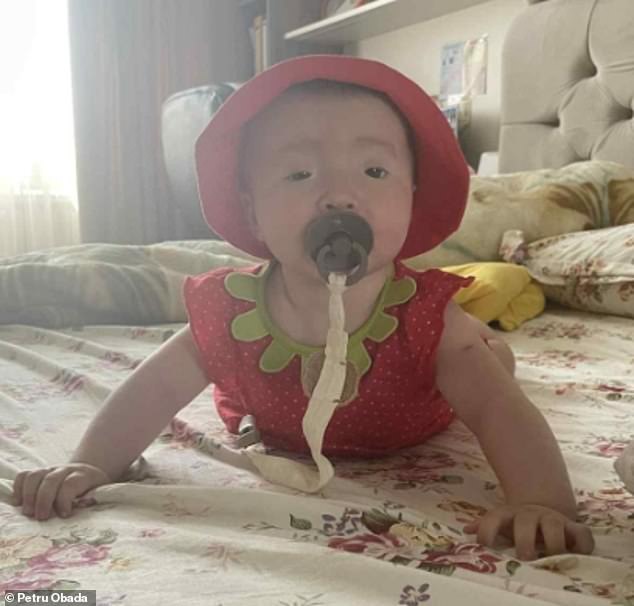
Working against the clock, Petru and Natalia are hoping the surgery will give Sophia her eyesight back, but without exposure to light, their daughter’s chances are deteriorating
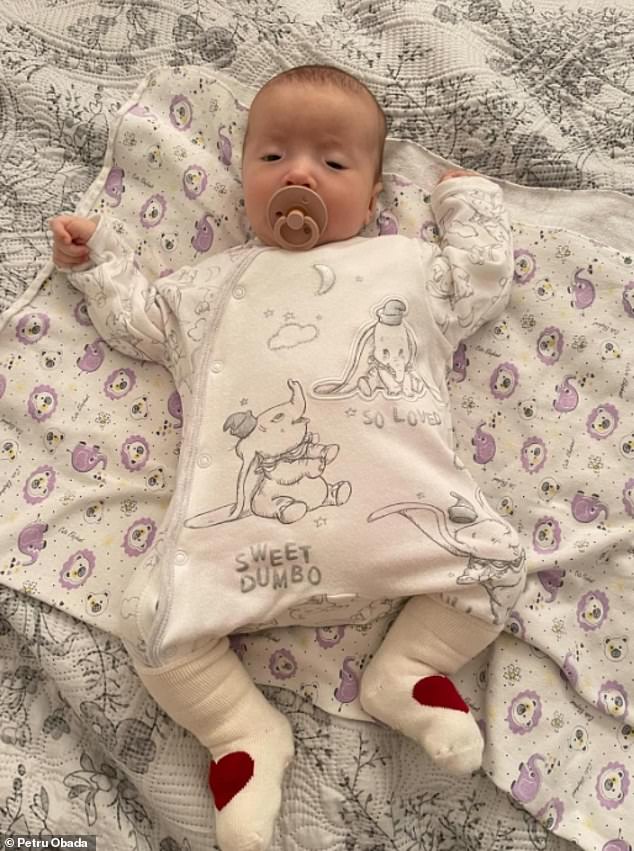
After three or four days, Petru noticed Sophia had still not opened her eyes and took her along to the GP who referred them to a specialist
‘Her eyelids looked much smaller compared to other babies,’ Petru said.
‘I remember how our son had opened his, big eyes right away. And, it was clear that something was different with Sophia.’
But the disease, which affects one in 50,000 babies, is so rare that even doctors didn’t spot it and signed mother and baby off as safe to go home.
Petru said: ‘Straight after delivery nobody said anything. Even the doctors didn’t notice.’
Despite being signed off at the hospital, the worried family took Sophia along to the GP who referred them to a specialist immediately.
Petru said: ‘After three or four days, I noticed, something wrong with her eyes, and we took her to GP. They referred us to a pediatrician.
‘So the doctor confirmed there was a problem, but she admitted she had never seen anything like this before.’
Petru said it was ‘scary’ knowing even the doctors didn’t know anything about the condition and confessed his wife Natalia ‘cried a lot’ following the heartbreaking news.
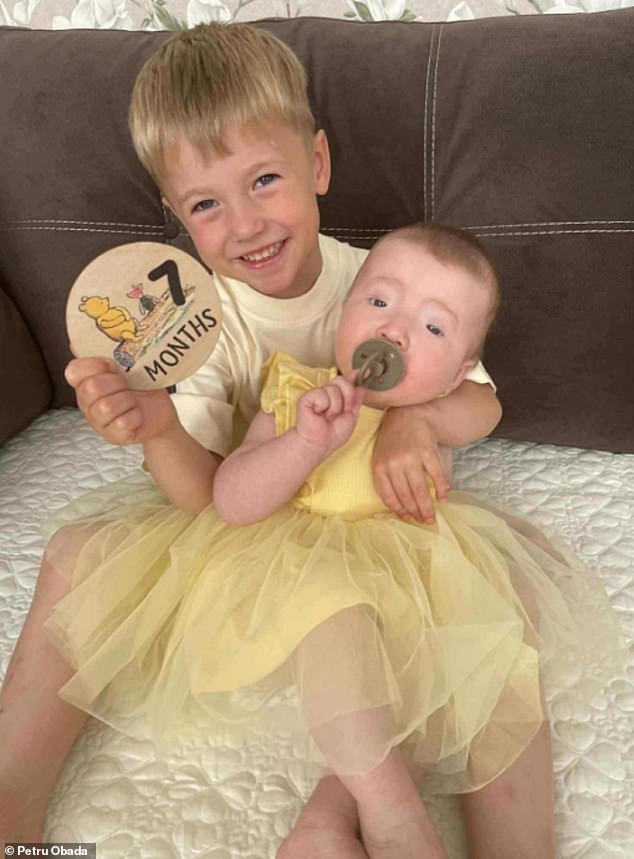
Sophia was diagnosed with Blepharophimosis Ptosis Epicanthus Inversus Syndrome which affects one in 50,000 babies
After several tests, including genetic blood tests for Petru, Natalia and Sophia, doctors concluded there were no issues with Sophia’s parents but that the little girl had Blepharophimosis Ptosis Epicanthus Inversus Syndrome (BPES).
BPES is a group of syndromes that affect the eyelids or eye placement.
Sophia has Type 1 which has prevented her eyelids from fully opening, restricting her vision and potentially leading to permanent sight loss.
After their blood tests, the family were referred to specialists at Oxford University Hospital where genetic experts explained her condition in detail.
The family discussed treatments and discovered that without medical intervention, Sophia would permanently lose her sight.
The treatments include attaching a thread from her eyelids to her eyebrow so she can manually open and close her eyelids or a more advanced treatment offered in Spain.
This new operation would involve attaching little Sophia’s eyelid muscles to her eyebrows allowing for a more natural and more permanent fix and meaning the nine-month-old would be able to see properly for the first time in her life.
But Petru told the Daily Mail that time is against the family.
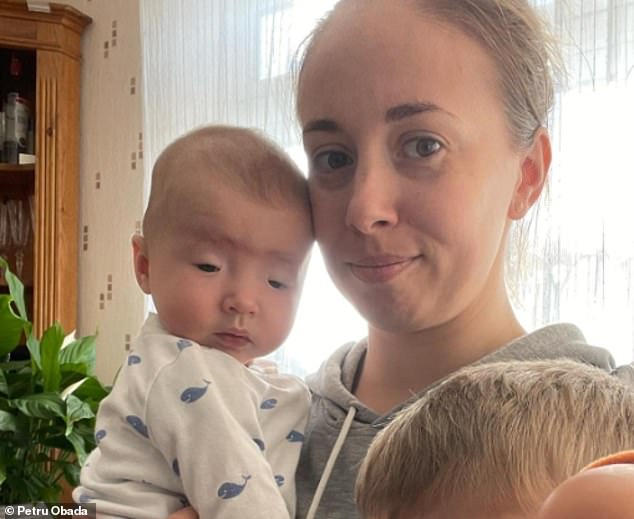
The family were told without medical intervention, Sophia would permanently lose her sight (pictured with her mother)
Sophia’s eyesight could deteriorate too much due to a lack of exposure to light meaning she could be left permanently blind.
Petru confessed they have an upcoming appointment where they will check to see whether his daughter’s sight has got worse.
He added: ‘They’re going to check because if it has got worse we might need to do the surgery straight away.
‘Otherwise they recommend doing it when she’s three but the doctors in Spain say as soon as possible is the best option.’
But Petru is confident the surgery will change his daughter life, saying: ‘We’re sure about this. We’ve heard a lot of good stories and we’re dedicated to go there.’
Despite their confidence, Petru and Natalia have been finding the whole process very worrying and isolating without a family support network.
He said: ‘It’s very difficult, especially because there’s nobody here to support us. We only have each other, but we’re going to do whatever we need to make sure she can see the world.’











